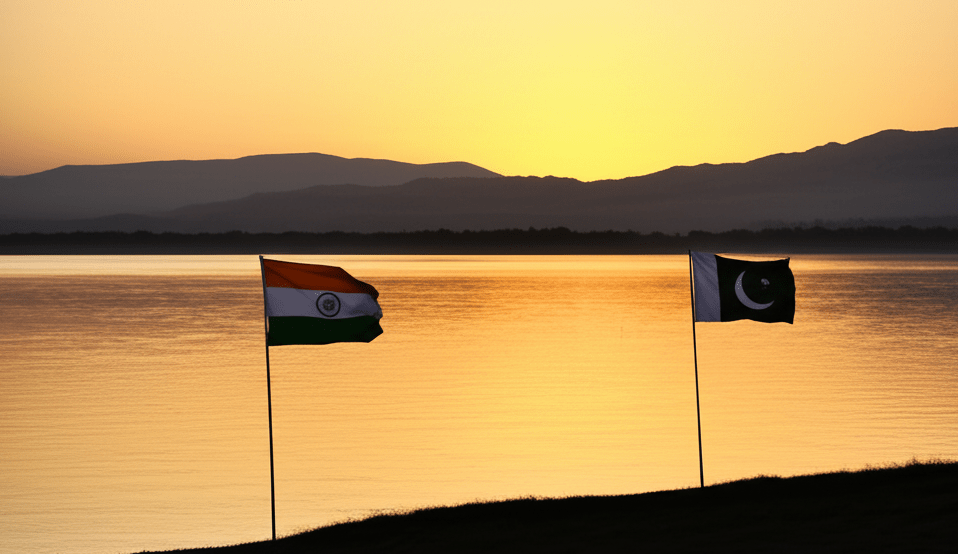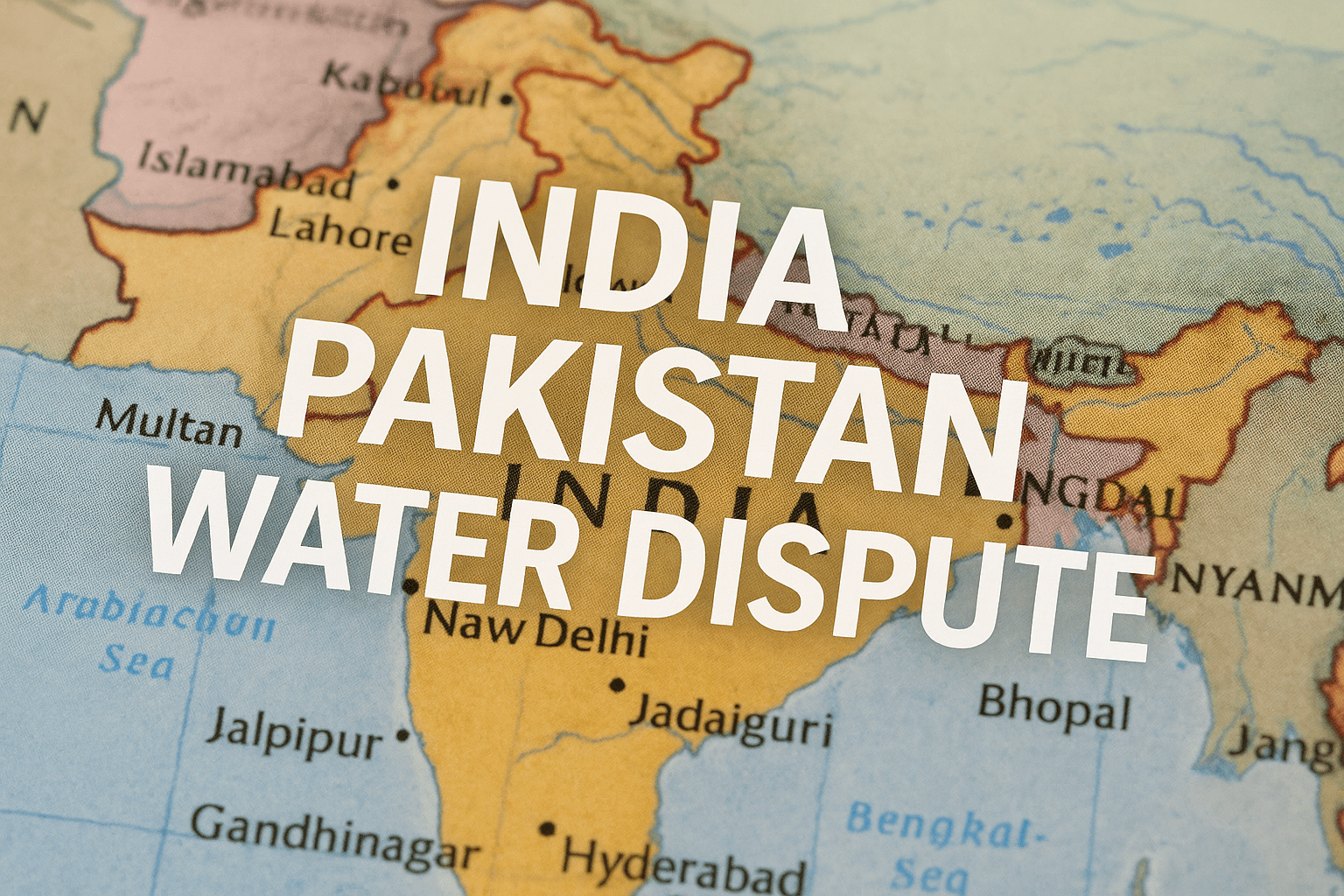|
Getting your Trinity Audio player ready... |
The India Pakistan water dispute has erupted into a fresh diplomatic storm after Prime Minister Shehbaz Sharif issued an unflinching warning to India, vowing “serious consequences” if New Delhi continues actions that Islamabad claims are disrupting Pakistan’s rightful share of river waters.
Speaking to reporters in Islamabad, Sharif accused India of “playing a dangerous game with nature” by allegedly diverting and restricting water flows from rivers governed under the historic Indus Waters Treaty. “Water is not just a resource it is life for millions of Pakistanis,” Sharif declared. “If India continues down this path, we will respond with strength and strategy. We will defend our rights at all costs.”

This latest escalation in the India Pakistan water dispute comes amid mounting tensions between the two nuclear-armed neighbors, where political, security, and environmental challenges are deeply intertwined.
Read this – India Russian Oil Imports: Trump’s New Tariffs Ignite Global Market Debate
Sharif’s Stern Warning Amid Indus Waters Treaty Dispute
At the heart of the conflict lies the Indus Waters Treaty dispute, a decades-old agreement signed in 1960 that allocates the use of six major rivers between the two countries. Pakistan relies heavily on the Indus, Jhelum, and Chenab rivers for its agriculture, drinking water, and hydropower generation. Any disruption in flow could cripple its farming sector, jeopardize food security, and strain its energy supply.
Sharif accused India of violating both “the letter and spirit” of the treaty through construction of large dams and hydropower projects in Jammu and Kashmir. He warned that if India persists, Pakistan will take the issue to every possible international platform, including the United Nations and the International Court of Justice.
“This is not just a bilateral issue. This is a question of regional stability,” Sharif said, adding that Pakistan warns India over water not as a threat, but as a defense of its sovereignty and survival.
Indian officials, however, insist that all projects comply with the treaty’s stipulations and that Pakistan’s accusations are politically motivated. They maintain that India has the right to use waters from the eastern rivers Ravi, Beas, and Sutlej while Pakistan controls the western rivers, as the treaty outlines.
A Brewing South Asia Water Crisis
The Pakistan India river conflict is not a new story, but it is becoming more urgent as climate change tightens its grip on South Asia. Melting glaciers in the Himalayas, erratic monsoon patterns, and rising temperatures are intensifying water scarcity. Experts warn that these environmental stresses could transform water from a shared resource into a source of constant confrontation.
According to regional analysts, the India Pakistan water tensions are part of a broader South Asia water crisis. Both countries face growing populations, shrinking freshwater reserves, and increasing demands on agricultural production. In such conditions, any alteration to river flows real or perceived becomes a spark that can ignite larger disputes.
Dr. Farah Khan, a prominent environmental policy expert, explained: “The Indus Basin is the lifeline of Pakistan. Even small reductions in flow can devastate crops, increase rural poverty, and trigger mass migration. In a politically sensitive region, this can escalate beyond environmental concerns into full-scale security risks.”
Pakistan’s Diplomatic and Strategic Moves
In response to the current situation, Sharif’s government has called an emergency meeting of parliament to finalize a national water security plan. According to reports, this plan will involve technological steps to maximize domestic water consumption, legal proceedings in international forums, and diplomatic outreach to friendly countries.
Pakistan has already engaged with the World Bank, the treaty’s guarantor, to mediate in the Indus Waters Treaty dispute. However, Islamabad claims India has repeatedly avoided third-party arbitration and rejected international oversight.
Sharif’s water warning was echoed by Pakistan’s military leadership, signaling that the issue is being treated not only as a diplomatic challenge but also a matter of national defense. While officials avoided direct threats, they emphasized that Pakistan’s response would be “firm and proportionate” if its water rights are endangered.
Global and Regional Reactions
The international community has taken note of the growing rift. The United Nations urged both nations to honor their treaty commitments and resolve differences through peaceful dialogue. Meanwhile, analysts in Washington, Beijing, and Gulf capitals are closely monitoring developments, given the region’s importance for global trade and security.
India’s Ministry of External Affairs responded tersely, reiterating that “India remains committed to the treaty” and blaming Pakistan for politicizing technical water management issues. This statement has done little to calm Islamabad’s concerns.
An Uncertain Future for the India Pakistan Water Dispute
The India Pakistan water dispute shows no signs of easing. Both sides remain entrenched, with trust eroded by decades of military conflicts and political hostilities. While the treaty has survived multiple wars, its endurance now faces perhaps its greatest test.
In Pakistan’s rural heartlands, farmers are already feeling the strain. Reduced irrigation, unpredictable water releases, and delayed planting seasons are cutting yields and threatening livelihoods. Many worry that if the dispute escalates, they will bear the brunt of the consequences.
Observers warn that unless the two nations commit to transparent water-sharing mechanisms, they risk sliding into a permanent state of India Pakistan water tensions a scenario that would harm millions and destabilize the entire region.
For now, Sharif’s message to India is clear: “Water is life. We will not allow anyone to steal our lifeline.”







